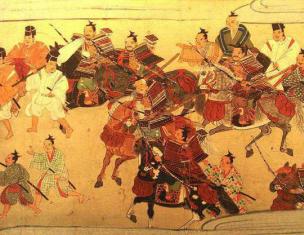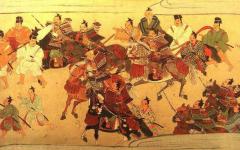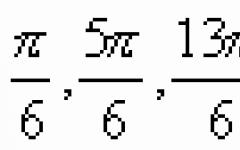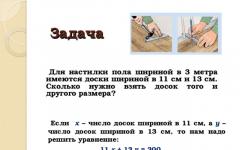Every day you and I compare different things: this car is better than that one, and the other one is generally the best. One person is cuter than the other. And someone considers himself the most beautiful.Today you will learn about degrees of comparison of adjectives in English: what they are and how they are formed.
What is an adjective?
An adjective is a word that denotes a quality (attribute) that an object or person has. For example: tall, clear, smart.
Attention! Don't understand how to build sentences? Sign up and find out how competently and quicklyconstruct your sentences in English.
What degrees of comparison are there for adjectives?
Depending on what we are comparing, we can distinguish several degrees of comparison. Let's look at examples of how we can compare objects.
1. Comparison of 2 items based on a common feature.
- And we need to understand who has these qualities more.
We can compare these apples by their redness.

Note that we can compare things only if they have the same qualities. For example, we cannot compare these apples based on their redness:

2. Comparing an object with the same thing, but at different times.
- We have an object (person) that has some quality during a certain period of time.
- There is the same item, but in a different time period.
- And we need to understand what has changed in this capacity over this period.
We can compare apples by freshness:
.jpg)
3. Comparing objects with each other in order to identify the one with the most pronounced characteristic.
- We have an object (person) that has some quality.
- There are other items that have the same qualities.
- And we understand which object (person) of all of them is the best in terms of these qualities.

This is the reddest apple of all the apples on this plate.
Thus, two degrees of comparison can be distinguished:
- Comparative - we compare objects based on characteristics (examples 1 and 2).
- Excellent - we compare objects in order to identify the object with the most pronounced characteristic (example 3).
Now we will consider each degree of comparison separately.
How the comparative degree of adjectives is formed in English

We need it to compare something or someone with each other. For example, one car is more expensive than another, my friend is older than me.
Depending on the adjective, there are 2 comparative forms:
1. Simple form of comparative degree formed with adjectives that consist of one, two or three syllables. For example: soft (soft), new (new), dirty (dirty), calm (quiet), cool (cool), deep (deep).
2. Complex form of comparative degree formed with adjectives that consist of three or more syllables. For example: dangerous, frightened, effective, handsome, interesting, surprised.
1. Simple form of comparative degree of adjectives formed by adding the ending -er.
adjective + -er
Small (small) - small er(less);
sweet (sweet) - sweet er(sweeter).
For example
Your hair is long er than mine.
Your hair is longer than mine.
Her car is cheap er than his.
Her car is cheaper than his.
Below we will tell you what nuances there are when adding -er.
2. Complex comparative form adjectives is formed using the words more (more) or less (less), which are placed before the adjective.
more/ less+ adjective
Cheerful (happy) - more cheerful (happier);
strange (strange) - less strange (less strange).
For example
Explain your idea more clearly.
Explain your idea more clearly.
This book is more interesting than that.
This book is more interesting than that one.
Rules for adding the ending -er
1. If the adjective ends in -e, then only the letter -r is added:
larg e(huge) - larg er(larger);
simple e(simple) - simple er(simpler).
Boys are brav er than girls.
Boys are braver than girls.
2. The last consonant is doubled if there is a vowel before it:
b ig(big) - bi gger(more);
h ot(hot) - ho tter(hot).
China is bi gger than Japan.
China is bigger than Japan.
3. If the adjective ends in -y, then -y changes to -i:
dr y(dry) - dr ier(drier);
eas y(light) - eas ier(easier).
He was lucky ier than many painters.
He was luckier than many artists.
How are the superlative degrees of adjectives formed in English?

We need superlatives to show that an item has the best characteristics: the largest, the most expensive, the best. For example: “This is the most talented writer I have ever read.”
Depending on the adjective, there are 2 superlative forms.
1. Simple superlative form formed with adjectives that consist of one, two or three syllables.
2. Complex superlative form formed with adjectives that consist of three or more syllables.
1. Simple superlative form adjectives formed by adding the ending -est. Before the adjective itself we put the article the.
the+ adjective + -est
The rules for adding the ending -est are the same as adding the ending -er.
Small (small) - the small est(smallest);
easy (easy) - the easy est(the easiest).
Examples
2. Complex superlative form adjectives is formed using the words most (most) or least (smallest), which are placed before the adjective. Before these words we put the article the.
the + most/least +adjective
beautiful (beautiful) - the most beautiful ( most Beautiful);
interesting (interesting) - theleast interesting ( least interesting or the most Not interesting).
For example
How much is the most expensive car?
How much does the most expensive car cost?
Summer is the most favorite season of mine.
Summer is my favorite time of the year.
He is the least talented actor in our class.
He is the least talented actor in our class.
Exceptional adjectives in the comparative degree in English
In English there are adjectives whose comparative and superlative degrees are not formed according to the rules. The only option is to remember them. Here are the most common ones.
| Adjective | Comparative degree | Superlative |
| good good |
better better |
the best the best |
| bad bad |
worse worse |
the worst the worst |
| little small |
less less |
the least least |
| many/much numerous |
more more |
the most greatest |
| old (about family members) old |
elder older |
the eldest the oldest |
| late late |
later last one listed |
the last last in order |
Examples
The weather today is worse than yesterday.
The weather today is worse than yesterday.
This pen is the best.
This pen is the best.
So, today we looked at the comparative and superlative degrees of comparison of adjectives. If you have any questions, ask them in the comments.
Reinforcement task
Now put the following adjectives into comparative and superlative form:
- expensive,
- strong,
- loud,
- dangerous,
- high,
- clever, clever
- interesting,
- dirty
- lazy,
- generous,
- clean
- rich
- good,
- important.
Leave your answers in the comments below the article.
In English, all adjectives can have 3 degrees of comparison: positive, comparative and superlative. And English-speaking people always use them, despite the fact that almost every one of them could already have forgotten about the names of such degrees. As a result, it has long become clear: it is not at all necessary to know all the names of the elements of the language, the main thing is to use them skillfully and correctly. In everyday life, you rarely have to talk about topics like grammar or vocabulary. It is possible that only children and language learners need such discussions.
Such a preface does not touch on the main topic, but simply helps to gradually focus on the material. Well, now briefly about the superlative degree of adjectives in English.
Superlative adjectives helps highlight the highest degree of quality of an object. For example: the Russian adjective “cheap” in the superlative degree will sound like “the cheapest”. Or the adjective “good” in the superlative degree will sound like “the best.” And so on.
Now let's look at how to compose superlative degree in English.
Here we either add the suffix “est” to the end of the adjective, or we add the adverb “most” before the adjective. Usually the definite article “the” is used before a superlative adjective. Let's look at everything in more detail:
To adjectives with one syllable, add the suffix “est”:
| Adjective | Translate | Superlative | Translate |
|---|---|---|---|
| cheap | cheap | cheapest | cheapest |
| small | small | smallest | the smallest |
| hot | hot | hottest | the hottest |
| wide | wide | widest | the widest |
| nice | nice | nicest | the most pleasant |
Basic spelling rules
Example:
- The house is the cheapest in the district – This house is the cheapest in the district.
- My satchel is the smallest in the class - My backpack is the smallest in the class.
- It's the coldest winter I’ve ever seen – This is the coldest winter I’ve ever seen.
For adjectives with two syllables ending in er, ow or y (“y” changes to “i”) add the suffix “est”
Example:
- I'm the happiest man in the world - I am the happiest man in the world.
- It was the narrowest way I’ve ever gone – It was the narrowest path I’ve ever walked on.
- Lake Baikal is the deepest lake in the world – Baikal is the deepest lake in the world.
For other adjectives with two syllables there is an adverb "most"
| Adjective | Translate | Superlative | Translate |
|---|---|---|---|
| boring | boring | most boring | the most boring |
| honest | honest | most honest | the most honest |
| careful | careful | most careful | the most careful |
Example:
- All say that he’s the most careful player in poker – Everyone says that he is the most careful player in poker.
- My uncle is the most honest man in our family - My uncle is the most honest man in our family.
- It's the most boring game I’ve ever seen – This is the most boring game I’ve ever seen.
Before adjectives with three or more syllables, we also use the word “most”
| Adjective | Translate | Superlative | Translate |
|---|---|---|---|
| beautiful | beautiful | most beautiful | the most beautiful |
| expensive | Expensive | most expensive | the most expensive |
| interesting | interesting | most interesting | the most interesting |
Example:
- Fedor is the most dangerous fighter – Fedor is the most dangerous fighter.
- This collection of book is the most interesting I’ve ever read - This is the most interesting collection of books that I have ever read.
- I think Helen is the most beautiful girl in the group - I think Lena is the most beautiful in the group.
This is what all the material on this topic is based on. But any rule always has a couple of exceptions:
- good – best
- bad – worst
Example:
- You're the best singer in your collective - You are the best singer in your collective.
- It was the worst day in his holidays – It was the worst day on his holiday.
As you can see, superlative adjectives used to compare one thing with things of the same kind for a certain quality. And is often used in combination with the…in, the…of or simply the:
- This is the most comfortable car in the world
- This is the most interesting book of them all
- This is the strongest man here
It is worth noting that superlative adjectives with a negative prefix are formed in exactly the same way as without it:
- unkind – unkindest
- unhappy - unhappiest
- dishonest - dish mostonest
P.S. However, it would be better and more common to say no as kind as... or not as honest as... than unkindest or dishonest.
Superlative adjectives can also be combined with it’s by far or it’s easily:
- It’s by far the most expensive car in the world
- It’s easily the most expensive of all the cars I’ve seen
This is probably the end. Studying degrees of comparison of adjectives will help you combine and compare some objects with others, as well as formulate more colorful speech, which certainly will not hurt anyone.
For those who feel like a Jedi, we recommend taking split training
Both in Russian and in English adjectives have three degrees of comparison: positive, comparative and superlative.
Positive degree of adjectives in English used in the following designs:
as...as – "same...as", "same", etc.
For example:
Jane is as tall as John.
Jane the same growth, How and John. (= Jane and John are the same height.)
not as … as / not so … as – "not like... like".
For example:
John is not as tall as Arnie.
John not like that high, How Arnie.
Comparative and superlative degrees of adjectives in English are formed in two ways.
In the first case, if the adjective is monosyllabic, i.e. consists of one syllable (for example, clean, new, cheap) or of two, where the second syllable ends in –y or -er, then degrees of comparison of such adjectives are formed by adding endings -er And -est.
Pay attention to the spelling changes when forming degrees of comparison of monosyllabic adjectives:
Unpronounceable" e" is omitted at the end, for example:
late – late r– the late st
If the word ends in -y, preceded by a consonant, then " y"changes to" i", For example:
eas y–eas i er – the eas i est
If a word ends with a consonant preceded by a short stressed vowel, the final consonant is doubled, for example:
ho t-ho tt er – the ho tt est
In the second case, if the adjective consists of three or more syllables, or of two syllables, where the second syllable ends Not on -y And -er, then degrees of comparison of such adjectives are formed using words more And most.
Some adjectives can be formed in both ways, for example:
narrow – narrow er/more narrow – the narrow est/the most narrow
shallow – shallow er/more shallow – the shallow est/the most shallow
quiet – quiet er/more quiet – the quiet est/the most quiet
Note that the superlative adjective is preceded by the definite article the. There is a completely logical explanation for this - the superlative degree distinguishes an object or concept from a number of similar ones due to the maximum presence of one or another attribute. Therefore, we are talking practically about one of a kind(or this group) subject.
It is possible to use intensifying words before comparative adjectives much, a lot, far- in meaning "much", "much", etc., a little, a bit, slightly- in meaning "not (by) much", "a little bit", etc.
For example:
Let's go by plane. It's much faster and much more comfortable.
Let's fly by plane. So much faster and much more convenient.
My brother is a little taller and slightly more intelligent than yours.
My brother A little higher and a little smarter than you.
The repetition of adjectives in the comparative degree means duration or continuation (in such cases, the Russian " All"), For example:
More and more people were coming.
People All came and came.
He was getting older and older.
He was becoming All older.
It is possible to use indefinite pronouns before an adjective in the comparative degree. any And no, For example:
This report wasn't any better than the previous one.
This report was not at all no better than the previous one.
You are no better than me.
You nothing better than me.
If you want to emphasize the dependence of one action on another, you can use the expression the + comparative adjective + the + comparative adjective, which translates as " than... the", For example:
The sooner you"ll start, the sooner you"ll finish.
The sooner you will start the sooner finish.
The richer you are the more difficult your life is.
How You richer, the more difficult your life.
Pay attention to the following adjectives, the degrees of comparison of which are formed differently than indicated above. These adjectives and their derivatives just need to be remembered.
| Positive degree | Comparative degree | Superlative |
| good - good | better - better | the best - the best |
| bad - bad | worse - worse | the worst - the worst |
| little - small | less - smaller | the least - the smallest |
| much - a lot | more - more | the most - most of all |
| far – distant, distant | farther - more distant (about distance) further - further (figuratively) |
the farthest - the farthest (about distance) the furthest - the farthest (both literally and figuratively) |
| late - late | later - later the latter - the last (of the two listed) |
the latest – the latest, last (in time) the last - the most recent in order, the last |
| near - close | nearer - closer | the nearest - closest in distance value the next - next in order, future |
| old - old | older - older elder (eldest in the family) |
the oldest - oldest, oldest the eldest - the eldest in the family |
Cold - colder - the coldest. What were we doing now? Comparisons were made using Russian adjectives. Do you think there is no such thing in English? Please: cold - colder - the coldest. This is it degrees of comparison of adjectives. We are lucky: there are exactly the same degrees of comparison as in Russian. That is, simply comparative (colder) and superior (coldest). Now let’s find out how degrees of comparison of adjectives are formed.
1. If an English adjective is taken from one syllable ( old , big , hot , kind , great), then the comparative degree is formed by the ending -er (older , kinder), and excellent is an article the and ending - est (the oldest , the kindest ).
Two-syllable adjectives ending in - y , -er , -ow (spicy , clever , narrow) are subject to the same rules:
cleverer - the cleverest (smarter - the smartest), narrower - the narrowest (narrower (narrower) - the narrowest)
Moreover, adjectives that end in - y , change this letter to i :
spicier - the spiciest (spicier - the hottest)
If a one-syllable adjective ends in vowel+consonant (hot, big, sad, fat), then in comparative degrees the consonant doubles:
hotter - the hottest, fatter - the fattest.
2. All other two-syllable, three-syllable (etc. - in general, polysyllabic) adjectives form the comparative degree by adding more , and excellent - the most :
more significant - the most significant,more beautiful - the most beautiful
Exception Examples(favorite section of all English learners):
Good - better - the best
Bad - worse - the worst
Little - less - the least
Far
-
farther(more distant (by distance)) - the
farthest(furthest)
But
far
-
further(further/subsequent) - the
furthest(most distant)
Near - nearer - the nearest/the next (closest (by distance)/next)
Old - older(older) - the oldest(oldest),
But
old-elder(older)- the eldest(oldest)
Late
-
later(later) - the
latest(latest),
But
late
-
the latter(later in order) - the
last(most recent in order)
On the formation of degrees of comparison of adjectives- All. I congratulate you on this. But if you want more, then you are always welcome (recommended for those who have already understood everything with the previous part):
Use less degree of comparison (i.e. less cold, less bright) goes by using less , and to denote the smallest degree - the least (least cool, least bright):
less strong(less strong) - the least strong(least strong), less wide(less wide) - the least wide(least wide).
To strengthen the comparative degree it is used much , still , far :
much colder(much colder ), much more beautiful(much prettier).
The sentence uses the connective to compare objects than (how):
She is cleverer than her sister(She is smarter than her sister).
And now degree scheme for those who love algorithms :)
everything is fine, pay attention Stop! Just cram!
It is difficult to imagine our life without comparing objects with each other or people with each other.
In Russian, two degrees are used to compare adjectives:
– comparative;
– excellent.
In this regard, Russian and English grammar are no different; in English, adjectives also have two degrees of comparison.
However, the rules for forming comparative degrees of English adjectives have their own difficulties, and in order not to make mistakes in them, study several tables prepared for this lesson.
Table 1. Formation of the comparative degree of monosyllabic adjectives.
|
Rule The comparative degree of monosyllabic adjectives is formed by adding the suffix –er. It should be noted that some two-syllable adjectives also form the comparative degree according to this rule. |
||
|
Positive degree |
Comparative degree |
Example |
| cheap - cheap | cheap er – cheaper, cheaper | My car is cheaper than yours – My car is cheaper than yours. |
| clean - clean | clean er – cleaner, cleaner | I think John's garden is cleaner than his house - I think John's garden is cleaner than his house. |
| fast - fast | fast er – faster, faster | You must swim faster if you want to win – You need to swim faster if you want to win. |
| narrow - narrow | narrow er – narrower, narrower | Streets of our city are narrower than in Moscow - The streets of our city are narrower than in Moscow. |
| easy - light | easy er – lighter | Sometimes it's easier to agree than to argue – Sometimes it’s easier to agree than to argue. |
Table 2. Formation of the superlative degree of monosyllabic adjectives.
|
Rule The superlative degree of monosyllabic adjectives is formed by adding the suffix –est and definite article. It should be noted that some two-syllable adjectives also form the comparative degree according to this rule. |
||
|
Positive degree |
Superlative |
Example |
| near – close, nearest | the nearest – closest, closest | The nearest hospital is five kilometers away from here - The nearest hospital is five kilometers from here. |
| large - large | the largest - the largest | I need the largest size of shoes – I need the largest size of shoes. |
| funny - funny | the funniest - the funniest | It was the funniest day in my life – It was the funniest day in my life. |
| weak – weak | the weakest - the weakest | My friend is the weakest sportsman in this competition - My friend is the weakest athlete in this competition. |
| loud – loud | the loudest - the loudest | This is the loudest doorbell we have - This is the loudest doorbell we have. |
Table 3. Formation of the comparative degree of polysyllabic adjectives.
|
Rule The comparative degree of polysyllabic adjectives is formed using the word more. |
||
|
Positive degree |
Comparative degree |
Example |
| modern - modern | more modern – more modern, more modern | Her new flat is more modern than ours - Her new apartment is more modern than ours. |
| comfortable - convenient | more comfortable – more convenient, more comfortable | Can you find a more comfortable place to work? – Can you find a more convenient place to work? |
| modest - modest | more modest – more modest, more modest | My daughter is more modest than my son - My daughter is more modest than my son. |
| careful – caring | more careful – more caring, more caring | John is more careful than Tom – John is more caring than Tom. |
| expensive - expensive | more expensive - more expensive, more expensive | I thought that these flowers were more expensive - I thought that these flowers were more expensive. |
Table 4. Formation of the superlative degree of polysyllabic adjectives.
|
Rule The superlative degree of polysyllabic adjectives is formed using the word most and definite article before an adjective. |
||
|
Positive degree |
Superlative |
Example |
| serious - serious | the most serious - the most serious | This is the most serious event in December - This is the most serious event of December. |
| interesting – interesting | the most interesting - the most interesting | Cosmopolitan is the most interesting magazine for women – Cosmopolitan is the most interesting magazine for girls. |
| dangerous - dangerous | the most dangerous - the most dangerous | That my trip was the most dangerous in my life - That my trip was the most dangerous in my life. |
| useful - useful | the most useful - the most useful | It was the most useful advice of you - This was your most useful advice. |
| beautiful – beautiful | the most beautiful - the most beautiful | You are the most beautiful woman I have ever seen - You are the most beautiful girl I have ever seen. |
Table 5. Exceptions.
6. Adjectives that do not have degrees of comparison.
Not all adjectives in English have degrees of comparison. Adjectives with degrees of comparison include quality adjectives (comparable adjectives).
Adjectives that do not have degrees of comparison are called relative adjectives (non-comparable or absolute adjectives), and they cannot be used with adverbs such as “very” or “too”.
Relative adjectives include awful, excellent, huge, impossible, terrible, unique, unknown, wrong, domestic, agricultural and many others.








